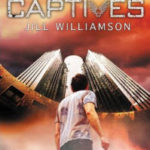Keep The Salt, Shine The Light
 The most outstanding element of Jill Williamson’s Safe Lands Trilogy is its world-building. From the opening pages of Captives, she created two worlds, orbiting no more than a rising mountain apart and yet utterly distinct. In the Safe Lands, all is pleasure and comfort and convenience, greased by the omnipresent wonders of technology.
The most outstanding element of Jill Williamson’s Safe Lands Trilogy is its world-building. From the opening pages of Captives, she created two worlds, orbiting no more than a rising mountain apart and yet utterly distinct. In the Safe Lands, all is pleasure and comfort and convenience, greased by the omnipresent wonders of technology.
In little Glenrock, life is harder and the rules are stricter. On everyone is laid clear expectations of who and what they are expected to be, and they feel it when they fail. But unlike the people of the Safe Lands, the people of Glenrock had the freedom to go, and even to stay much longer.
The entire trilogy is more or less about the collision of these two societies. These dual, conflicting worlds came to remind me of the Church and the larger culture of our present day. It’s not an exact resemblance, by any stretch; the world is not as dissolute or libertine as the Safe Lands, and the Christian community is not as strict or isolated as Glenrock. But the parallels can be drawn long.
In Rebels, the last book of the trilogy, readers became acquainted with the Kindred, a separatist group within the Safe Lands that made common cause with the Glenrock exiles. Not that all the Kindred were willing in this arrangement. In fact, one woman was so unfriendly and judgmental toward outsiders of any stripe that she reminded me of Glenrock’s own leader.
The founders of Glenrock and of the Kindred had excellent reasons for what they did. The separation from the Safe Lands was necessary to save themselves and their descendants from tyranny, deception, and all kinds of grief. Nor, in their fears and suspicions, were the people of these groups entirely unjustified. But it led some of the Glenrock folk to an unnerving callousness toward outsiders, and some of the Kindred to give up a much wider world for safety.
And Rebels, like Captives, left me thinking about the Church and the world. The New Testament rings with a sense of the separation between the Church and the world. It’s present in Christ’s image of His people as a city on a hill, in Peter’s addressing us as “aliens and strangers in the  world”, in Hebrews’ portrait of the heroes of faith “looking for a country of their own”. Paul commands Christians not to “conform any longer to the pattern of this world”, John instructs us not to love the world, and James goes farthest of all, warning us that friendship with the world is hatred toward God.
world”, in Hebrews’ portrait of the heroes of faith “looking for a country of their own”. Paul commands Christians not to “conform any longer to the pattern of this world”, John instructs us not to love the world, and James goes farthest of all, warning us that friendship with the world is hatred toward God.
But as with Glenrock and the Kindred, the necessary separation can turn to isolation and a noble mission can lose its focus to a selfish, inward concentration. The Church has been called to more than self-preservation. When we make preserving ourselves – or even preserving our families or communities – our only goal, we lose sight of God’s larger purpose.
Of course, when we cease to make guarding ourselves and our communities any sort of goal, we may lose God’s purpose in another way. The Safe Lands Trilogy captures that truth, too, showing not only what happens to those who become rather too narrow in the straight way, but also to those who fail to recognize and reject the false ideas of the world.
The same tension between preserving and going forth is found in the Sermon on the Mount, where Christ commands us both to keep our saltiness and to shine our light – and of such tension, perhaps, balance is made.
“You are the salt of the earth. But if the salt loses its saltiness, how can it be made salty again? It is no longer good for anything, except to be thrown out and trampled by men.
“You are the light of the world. A city on a hill cannot be hidden. Neither do people light a lamp and put it under a bowl. Instead they put it on its stand, and it gives light to everyone in the house. In the same way, let your light shine before men, that they may see your good deeds and praise your Father in heaven.”
This post was written for the CSFF blog tour of Rebels, by Jill Williamson, and is cross-posted from ShannonMcDermott.com.











































I like your remark about the church being called to more than mere self-preservation.
Sounds like an interesting series!